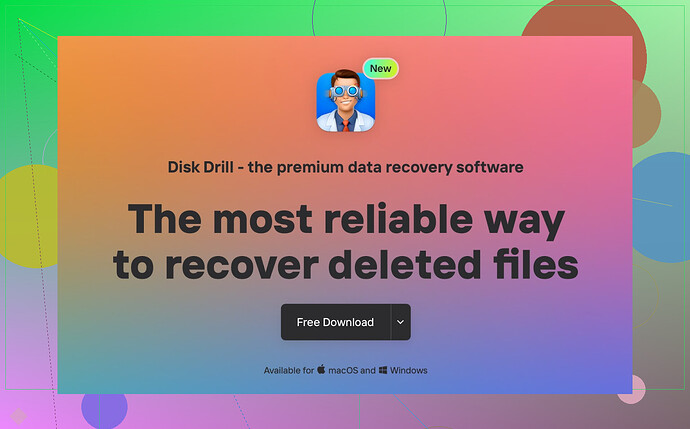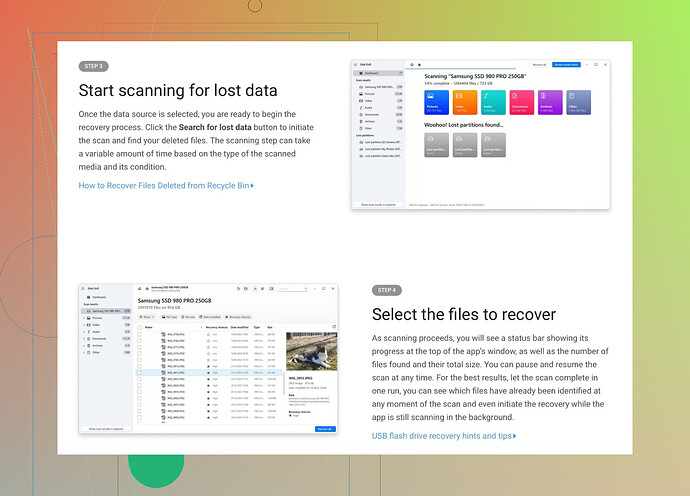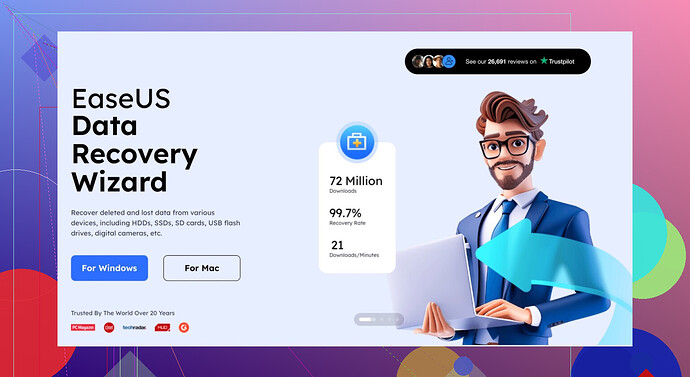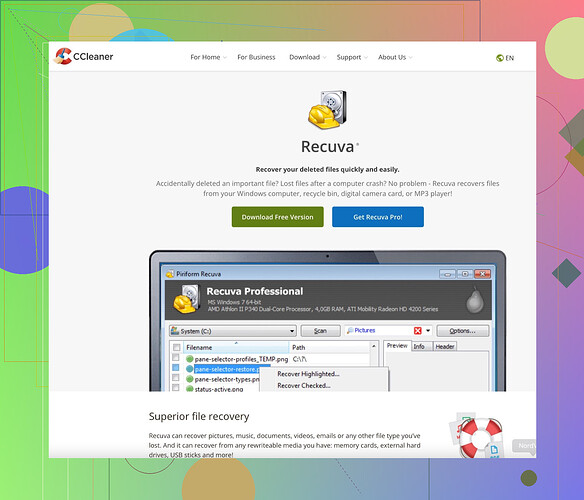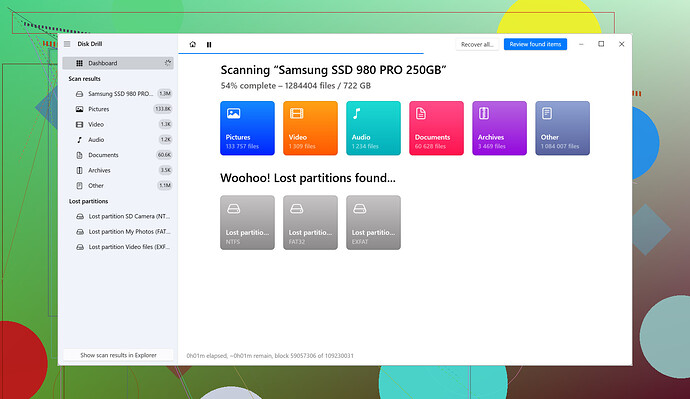I accidentally deleted important files from my computer and need help finding reliable data recovery software. Can anyone recommend a trusted program that works well for recovering lost data on Windows?
Top 10 Data Recovery Tools for Mac & Windows (Free & Paid Options)
Losing important files, whether it’s because of accidental deletion, device formatting, or an unexpected system crash, can leave anyone in a panic. Thankfully, technology offers solutions through data recovery software. Below, we’ll dive into the best tools available for both Windows and Mac, covering free and paid options to suit various needs.
1. Disk Drill (Mac & Windows)
Why Choose Disk Drill? (Pros)
 User-Friendly Design: Ideal for beginners with its intuitive interface.
User-Friendly Design: Ideal for beginners with its intuitive interface. Comprehensive Recovery: Can restore over 400 file types.
Comprehensive Recovery: Can restore over 400 file types. Extra Features: Includes Recovery Vault to prevent future data loss.
Extra Features: Includes Recovery Vault to prevent future data loss. Free Recovery (Windows): Offers 500MB of recovery at no cost.
Free Recovery (Windows): Offers 500MB of recovery at no cost.
Points to Consider (Cons)
- ✘ Limited Free Mac Version: You can only preview recoverable files.
- ✘ Time Intensive: Deep scans may require patience.
- ✘ Full Recovery is Paid: Requires purchasing a license for unrestricted use.
Overall Opinion
Disk Drill stands out for its simplicity and robust capabilities. It’s a great choice for casual users and professionals alike.
Explore more: Disk Drill Website
Reddit Reviews: Disk Drill Windows Review
Video Guide: YouTube: Best Data Recovery Software
2. EaseUS Data Recovery Wizard (Mac & Windows)
Why Choose EaseUS? (Pros)
 Effortless Recovery: Simplifies the process into just three steps.
Effortless Recovery: Simplifies the process into just three steps. Advanced Scanning: Uses AI-powered algorithms for detailed recovery.
Advanced Scanning: Uses AI-powered algorithms for detailed recovery. Generous Trial: Free version can recover up to 2GB.
Generous Trial: Free version can recover up to 2GB. Versatility: Handles partition and RAW data recovery.
Versatility: Handles partition and RAW data recovery.
Points to Consider (Cons)
- ✘ Small Free Limit: May not suffice for larger files.
- ✘ Slow Scans: In-depth scanning might take a considerable amount of time.
- ✘ Full Features Restricted: Requires a paid version for complete recovery options.
Overall Opinion
EaseUS appeals to everyday users who prefer a straightforward and effective recovery tool.
Explore user feedback: EaseUS Reviews
3. Recuva (Windows Only)
Why Choose Recuva? (Pros)
 100% Free: Unlimited recovery without a cost.
100% Free: Unlimited recovery without a cost. Lightweight: Operates quickly with minimal system resources.
Lightweight: Operates quickly with minimal system resources. Portable Version: Doesn’t require installation, perfect for on-the-go needs.
Portable Version: Doesn’t require installation, perfect for on-the-go needs.
Points to Consider (Cons)
- ✘ No Mac Support: Only available for Windows users.
- ✘ Basic Features: Lacks advanced recovery functions.
- ✘ May Struggle with Damage: Could falter with severely corrupted files.
Overall Opinion
Recuva is an excellent free tool for basic recovery tasks on Windows devices.
Check reviews: Reddit Community Thoughts on Recuva
4. Stellar Data Recovery (Mac & Windows)
Why Choose Stellar? (Pros)
 Specialist Features: Excels at recovering photos, videos, email files, and more.
Specialist Features: Excels at recovering photos, videos, email files, and more. Multiple Device Support: Recognizes data from various storage devices.
Multiple Device Support: Recognizes data from various storage devices. Free Trial: Allows 1GB of recovery for free.
Free Trial: Allows 1GB of recovery for free. Reliable Results: Offers a solid recovery success rate.
Reliable Results: Offers a solid recovery success rate.
Points to Consider (Cons)
- ✘ Limited Free Version: The 1GB cap may not meet all requirements.
- ✘ Slow Scanning: Analysis and recovery can require patience.
- ✘ Tiered Pricing: Advanced functionalities require premium plans.
Overall Opinion
A fantastic well-rounded option, especially for restoring multimedia files.
5. TestDisk & PhotoRec (Mac & Windows)
Why Choose This Tool? (Pros)
 Free & Open-Source: No hidden costs or licensing restrictions.
Free & Open-Source: No hidden costs or licensing restrictions. Flexible Use: Works flawlessly on multiple operating systems.
Flexible Use: Works flawlessly on multiple operating systems. Comprehensive Scans: Great for partition recovery and in-depth data searches.
Comprehensive Scans: Great for partition recovery and in-depth data searches.
Points to Consider (Cons)
- ✘ Command-Line Interface: May be intimidating for users unfamiliar with non-graphical tools.
- ✘ Steep Learning Curve: Best suited for tech-savvy individuals.
Overall Opinion
A powerful option for tech enthusiasts and advanced users seeking complete control over recovery processes.
6. R-Studio (Mac & Windows)
Why Choose R-Studio? (Pros)
 Top-Tier Capability: Known for its robust functionality, including RAID recovery.
Top-Tier Capability: Known for its robust functionality, including RAID recovery. File System Support: Handles diverse formats efficiently.
File System Support: Handles diverse formats efficiently. Enterprise-Grade: Trusted by IT professionals for network recoveries.
Enterprise-Grade: Trusted by IT professionals for network recoveries.
Points to Consider (Cons)
- ✘ Not for Novices: Complex user interface may deter casual users.
- ✘ No Free Option: Requires a paid account for significant recoveries.
Overall Opinion
R-Studio is a prime solution for experts who demand cutting-edge recovery power.
7. Wondershare Recoverit (Mac & Windows)
Why Choose Recoverit? (Pros)
 Beginner-Friendly: Smooth, intuitive interface for first-time users.
Beginner-Friendly: Smooth, intuitive interface for first-time users. Versatility: Supports over 1,000 types of files.
Versatility: Supports over 1,000 types of files. Targeted Features: Offers powerful video recovery tools.
Targeted Features: Offers powerful video recovery tools.
Points to Consider (Cons)
- ✘ Limited Free Trial: Only 500MB of recovery available for free.
- ✘ Slow Scans: In-depth recovery may take time to complete.
Overall Opinion
An excellent choice for those needing straightforward video recovery solutions.
8. Ontrack EasyRecovery (Mac & Windows)
Why Choose EasyRecovery? (Pros)
 Widely Respected: Trusted by professionals worldwide.
Widely Respected: Trusted by professionals worldwide. Free Trial: Offers 1GB of recovery in its free version.
Free Trial: Offers 1GB of recovery in its free version. Comprehensive Features: RAID and email recovery available in advanced plans.
Comprehensive Features: RAID and email recovery available in advanced plans.
Points to Consider (Cons)
- ✘ File Limitations: Free tier restricts files to 25MB per recovery.
- ✘ Premium Pricing: Advanced options can become costly.
Overall Opinion
A reliable tool for businesses or complex recovery cases.
9. Prosoft Data Rescue (Mac & Windows)
Why Choose Prosoft? (Pros)
 Focused Features: Excellent drive cloning for compromised devices.
Focused Features: Excellent drive cloning for compromised devices. Mac-Friendly: Tailored to Apple environments.
Mac-Friendly: Tailored to Apple environments. High-Quality Recovery: Strong functionality in retrieving deep-level data.
High-Quality Recovery: Strong functionality in retrieving deep-level data.
Points to Consider (Cons)
- ✘ Pay-Per-Recovery: Pricing structure can add up for frequent use.
- ✘ No Lifetime License: Requires repetitive purchases.
Overall Opinion
Highly compatible with Mac users requiring extensive recovery features.
10. MiniTool Power Data Recovery (Windows Only)
Why Choose MiniTool? (Pros)
 Simplicity: Easy interface for those with minimal tech skills.
Simplicity: Easy interface for those with minimal tech skills. Free Recovery: Recovers 1GB of files for free.
Free Recovery: Recovers 1GB of files for free. Quick Solutions: Ideal for recovering smaller files quickly.
Quick Solutions: Ideal for recovering smaller files quickly.
Points to Consider (Cons)
- ✘ Windows Restricted: Not available for Mac users.
- ✘ Lacks Depth: Limited options for advanced recovery scenarios.
Overall Opinion
A reliable entry-level tool for Windows users.
Wrapping It Up
Best Picks for Different Needs
- Beginners: Disk Drill, EaseUS, Recoverit.
- Free Solutions: Recuva (Windows) or TestDisk (Mac & Windows).
- Professional Grade: Disk Drill, R-Studio, Ontrack, Prosoft.
- Video Recovery: Wondershare Recoverit, Disk Drill.
For minor file loss, start with the free tools. However, for significant or complex recovery, investing in a paid service is well worth the cost to retrieve your valuable files.
I’ve been there—panic mode after deleting important files. Fortunately, when it comes to data recovery on Windows, you’ve got solid options. If I had to recommend just one, Disk Drill tends to be a game-changer. It’s user-friendly (a lifesaver when you’re already stressing), supports over 400 file types, and even offers 500MB of free recovery, which is perfect if you’re not dealing with massive files. Also, their deep scan feature seems to find stuff I didn’t even remember deleting. The downside? Yeah, the full version requires a paid license, but honestly, it’s worth the investment if your files are that crucial.
But I noticed @mikeappsreviewer mentioned Recuva as a free option too. Okay, yes, it’s completely free and fine for basic use, but if your files are in a more “oh no, everything’s broken” state, Recuva might not cut it—it struggles with super-damaged data. Disk Drill’s deeper scanning capability definitely has the edge there.
If you’re feeling extra cautious or on a budget, try something like EaseUS. However, their free version only gives you 2GB, and those “AI-powered” scans they rave about? Not exactly faster—be ready to kill some time.
Bottom line: if you’re serious about getting your files back without pulling your hair out, Disk Drill is probably where you want to start. It balances being easy to use and powerful enough for trickier situations.
Honestly, your best bet? Disk Drill. I know @mikeappsreviewer hyped up Recuva as a free option, and yeah, it’s cool if you’re just trying to recover, like, a Word doc you accidentally deleted. But if you’re talking about multiple file types or something crucial, Recuva falls short pretty quickly. It’s free for a reason—don’t expect miracles there.
Disk Drill, though? It’s got this super clean interface (thank goodness, because some of these tools look like they belong in the 90s), and it can handle over 400 file types. Plus, it gives you 500MB data recovery for free on Windows to get you started, so it’s not immediately putting your wallet in a chokehold. The deep scan actually works, though yeah, it can take a hot minute, so bring a snack.
EaseUS got a shoutout from @vrijheidsvogel, and it’s solid too, but that 2GB free limit—meh. Also, those “AI-powered scans”? Feels like a buzzword, because it still takes forever. Seems like they’re trying to make you think you’re piloting the Starship Enterprise when it’s really just another program doing the same stuff. If you’ve got time to kill, sure, give it a whirl, but Disk Drill just edges it out for ease and fewer headaches.
TL;DR: Disk Drill is worth it for Windows. Recuva if it’s a small, easy recovery. EaseUS if you’re okay waiting. Anything else? Meh—just depends on how bad you want those files back.
